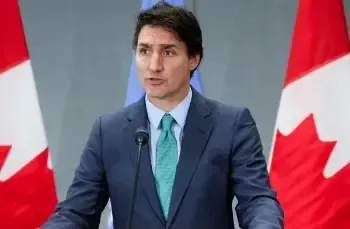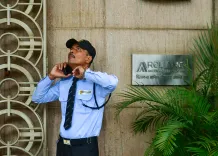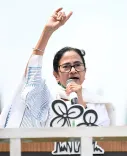Trudeau Concludes 11-Year Leadership Amidst Tensions with India

Ottawa, Jan 7 (NationPress) Justin Trudeau is concluding his 11-year leadership journey, which encompasses nine years as Canada’s Prime Minister, a term overshadowed by his confrontations with India and his alignment with Khalistani supporters.
On Monday, he declared his intention to resign as Prime Minister and the leader of the Liberal Party, while pledging to remain in his position until a successor is appointed.
Addressing the media outside his official residence, he stated, "I plan to step down as party leader and as Prime Minister after the party conducts a thorough, nationwide election for a new leader.”
He noted that the House of Commons would be prorogued until March 24, effectively pausing its activities and preventing the opposition from initiating a no-confidence vote against him.
Encouraged by his former ally, Jagmeet Singh, leader of the opposition New Democratic Party, Trudeau accused India of orchestrating a lethal campaign against Khalistani activists.
Some members of his administration made unsubstantiated personal allegations against certain Indian leaders, attempting to link India to the assassination of Khalistani leader Hardeep Singh Nijjar.
However, this was insufficient to appease Singh, whose support was critical for Trudeau's minority government.
Singh joined calls for Trudeau’s resignation as his poll numbers plummeted and his party faced turmoil following the dismissal of Deputy Prime Minister Chrystia Freeland.
This unrest led to Liberal Party MPs demanding Trudeau’s resignation.
The Trudeau administration's campaign against India did little to restore his standing.
A recent visit to India highlighted his government's ties with Khalistani elements.
Trudeau’s tendency for theatricality backfired during the trip, as he and his family donned Bollywood attire, which was overshadowed by an invitation extended to Jaspal Atwal, a Khalistani linked to an assassination plot against former Punjab Minister Malkiat Singh Sidhu.
The Liberal Party currently holds 153 seats in the 338-member House, significantly short of the 170 seats required for a majority.
Trudeau’s government was barely sustained after the New Democratic Party reneged on a support agreement established in September.
Any successor will need to garner support from minority parties.
Should this prove unfeasible, an early election before the October deadline may be unavoidable, potentially benefiting the opposition Conservative Party.
Conservative Party leader Pierre Marcel Poilievre is poised to capitalize on this situation, and should he assume the role of Prime Minister, a shift in Canada's policies is anticipated.
Poilievre has criticized Trudeau for damaging relations with India through perceived unprofessionalism.
In an interview with Toronto's Namaste Radio last year, he stated that Trudeau "is so incompetent and unprofessional that now we are embroiled in significant disputes with nearly every major power worldwide, including India.”
Trudeau has become "a laughingstock in India — the world’s largest democracy," Poilievre remarked.
Trudeau announced that he has asked Liberal Party President Sachit Mehra to initiate the leadership election process immediately.
Despite his diminishing popularity and the looming threat of electoral defeat, Trudeau asserted that his political journey is far from concluded.
"I'm a fighter. Every fiber of my being has always driven me to fight because I care profoundly about Canadians. I am deeply committed to this country, and I will always act in the best interests of Canadians," he stated.
The son of former Prime Minister Pierre Trudeau, Justin rose to the role of Prime Minister in 2015, following two years as party leader.
His term faced turbulence after he expelled Freeland, who previously held the finance portfolio, last month.
In her resignation letter, Freeland, who enjoyed considerable popularity, expressed, "I have found ourselves at odds regarding the optimal path forward for Canada.”
US President-elect Donald Trump, who threatened tariffs against Canada, further exacerbated Trudeau’s difficulties.
Trump accused Trudeau’s government of permitting illegal migrants to cross into the US, endangering national security.
A report from the Canadian Customs and Border Protection Service revealed that 358 individuals on terror watch lists attempted to enter the US from Canada in the fiscal year 2024, indicating Trudeau’s lenient policies towards terrorism.
After Trudeau's visit to him at Mar-a-Lago, Trump mockingly referred to him as the "Governor of the 51st State" due to his appeals for concessions.
Trudeau entered office with charisma and high ideals, leveraging his family legacy.
However, the allure faded as Canadians grappled with soaring costs and widespread anxiety regarding crime and quality of life.
Last month, the Angus Reid Institute's polling data indicated his approval rating had plummeted to a dismal 22 percent.








